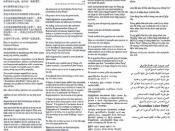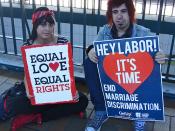Rhoy Villamizar 2/15/2008 APAH 1 DBQ Labor
After the Civil War the nation was led into a Second Industrial Revolution. The nation took in a new generation of immigrants. These new ones coming from Southern and Eastern Europe were all willing to take low paying jobs offered by the factories. These new immigrants were accustomed to radical ideas from their home lands and tied them into their newly found American organized labor. To a certain minor extent, organized labor was successful for being so persistent, although several obstructions hindered the use of labor union strikes.
The public's opinion was a major contributing factor in overruling labor. According to The New York Times, the public was sympathetic towards the strikers of Baltimore and Ohio Road. (Document B) However, during the year of that editorial, there was the Panic of 1877. Most people at that time were actually just starting to get suspicious of organized labor, showing how the factory companies were trying to justify their treatment of their workers.
Document C demonstrates that people viewed the strikers negatively as communists trying to undermine capitalism. Furthermore, the "Gospel of Wealth" was a theory spread by specific people like Cornwell and influential speeches. It states that wealth can be obtained by anyone that is willing to work for it and God will provide you with it at some point, viewing the poor as lazy people. Moreover, Document F portrays that labor unions were associated with anarchists and socialists.
According to Document D, the testimony of a machinist before the Senate shows that there was a rise in unskilled labor. Employers no longer needed as much workers to do the same tasks. That factor as well as wage cuts and panics led to more strikes. The Knights of Labor's failed when conflict emerged...


